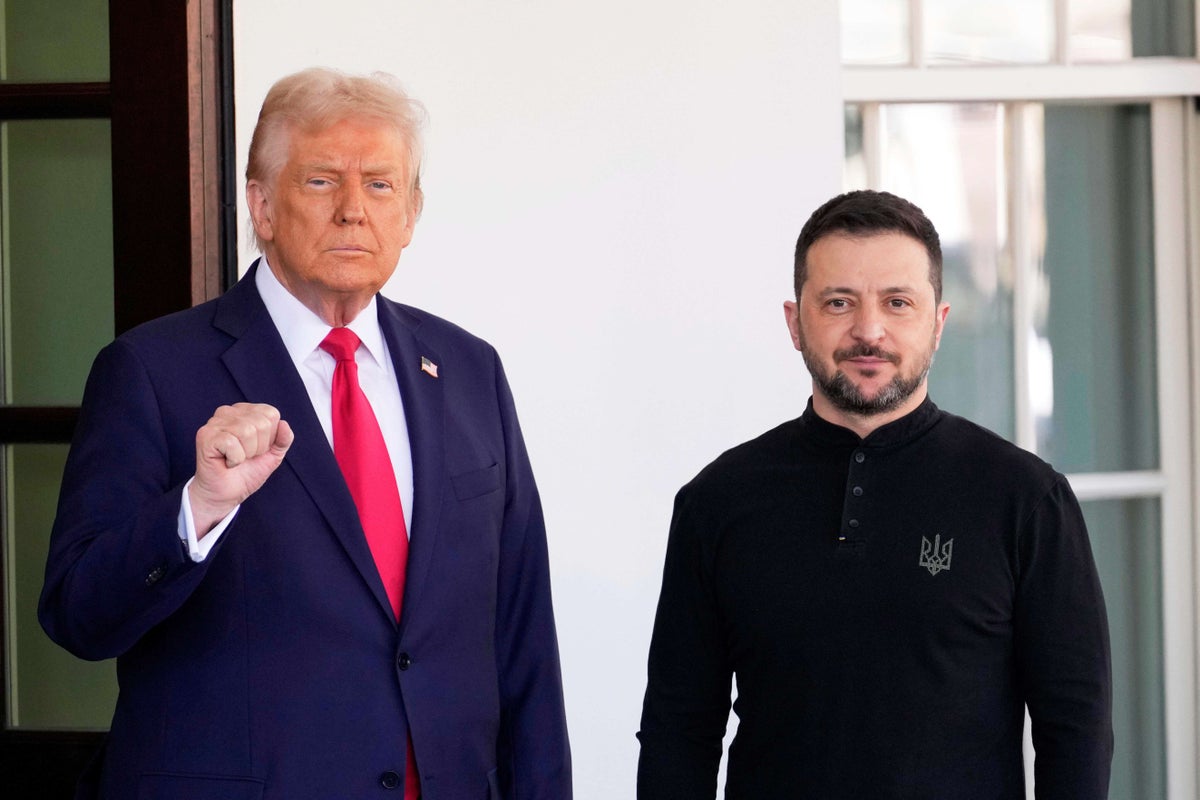Business
FTSE 100 edges up ahead of Trump-Zelensky talks

The FTSE 100 made steady progress on Monday ahead of talks between US President Donald Trump, his Ukrainian counterpart Volodymyr Zelensky and European leaders in Washington.
The gathering is a follow-up summit to Mr Trump’s meeting with Russian President Vladimir Putin in Alaska on Friday, which failed to produce a ceasefire in the war in Ukraine.
Michael Brown, senior research strategist at Pepperstone said Friday’s meeting turned out to be a “damp squib”, yielding “nothing by way of concrete progress.”
It “seemed to pretty much be a meeting about having another meeting to arrange more meetings, all while not achieving much,” Mr Brown quipped.
“While Zelensky and Trump will meet today, and that may bear some fruit, I shan’t be holding my breath,” he added.
The FTSE 100 index closed up 18.84 points, 0.2%, at 9,157.74. The FTSE 250 ended down just 8.67 points at 21,749.57 while the AIM All-Share finished 0.59 of a point higher, 0.1%, at 761.16.
In Europe, the CAC 40 in Paris fell 0.6%, while the DAX 40 in Frankfurt closed down 0.2%.
In New York, the Dow Jones Industrial Average was up 0.1%, the S&P 500 was 0.1% lower, and the Nasdaq Composite declined 0.2%.
Investors are also focused on a speech this week by US Federal Reserve chief Jerome Powell at the annual retreat of global central bankers in Jackson Hole, Wyoming.
Markets hope Mr Powell will provide more clues about the Fed’s plans for interest rates when it meets next month, after data last week provided a mixed picture about inflation.
Consumer inflation remained steady last month, but producer prices accelerated.
But JPMorgan said while “highly anticipated, it is useful to recall that several recent Jackson Hole speeches by Fed chairs did not break new ground or send clear policy signals”.
“We don’t think Powell can firmly guide toward easing at the next meeting,” it added.
The pound eased to 1.3517 dollars late on Monday afternoon in London, compared to 1.3566 dollars at the equities close on Friday. The euro dipped to 1.1667 dollars, lower against 1.1712 dollars. Against the yen, the dollar was trading a touch higher at 146.96 yen compared to 146.90 yen.
The yield on the US 10-year Treasury was at 4.35%, widened from 4.31%. The yield on the US 30-year Treasury was 4.95%, stretched from 4.90%.
In the UK, a report showed consumer sentiment improved a little in August, though it remained in negative territory.
The S&P Global UK consumer sentiment index advanced to 47 points in August from 45.1 points in July, still below the neutral 50-point mark.
It was the highest figure since last October’s UK government budget announcement, meaning a 10-month high.
Maryam Baluch, economist at S&P Global Market Intelligence, said: “August CSI data comes hot on the heels of the recent rate cut decision made by the Bank of England earlier in the month. Data collection began just a day after the central bank’s announcement, providing a timely snapshot of sentiment in the wake of monetary policy easing.
“Encouragingly, the data reveals a slight revival in household confidence, which is a telling sign that the easing of monetary policy has been received positively by households across the country. The headline index signalled the strongest reading since last October, greatly bolstered by robust perceptions of labour market conditions, which were the second-strongest in the survey’s history.”
On the FTSE 100, defence stocks Babcock International rose 5.0% and BAE Systems climbed 1.7% amid the Ukraine-Russia uncertainty.
Babcock received an added boost as RBC Capital Markets started coverage with an “outperform” rating and 1,200p per share price target.
The broker flagged Babcock’s strong management team, improved earnings quality and conservative guidance as reasons for upside.
On the FTSE 250, boot maker Dr Martens led the way, up 8.3% as Peel Hunt upgraded to “buy” from “add”.
The broker thinks Dr Martens is making clear progress under new management and believes the shares have not yet factored in the potential for the firm to move back into growth.
But Close Brothers led the fallers, down 3.7% as RBC downgraded to “sector perform” from “outperform” after the strong rally in the wake of the Supreme Court ruling on motor finance.
On AIM, Pantheon Resources leapt 16% after it said results from an appraisal well in Alaska exceeded expectations, highlighting the “enormous potential” in the firm’s portfolio.
Pantheon said the Dubhe-1 pilot hole was successfully drilled, logged and cored to a total measured depth of 12,833 feet.
Analysis of the thickness and quality of the primary target topset confirmed that the SMD-B zone has exceeded the upside pre-drill expectations.
Chief development officer Erich Krumanocker said: “We are delighted to announce the Dubhe-1 pilot hole results as a success. The well confirms the presence and quality of the oil and gas reservoirs in the Ahpun field, exceeding our pre-drill expectations.”
A barrel of Brent fell to 66.07 dollars late Monday afternoon from 66.33 dollars on Friday. Gold ebbed to 3,334.83 dollars an ounce against 3,343.39 dollars.
The biggest risers on the FTSE 100 were Babcock International, up 52p at 1,047p, Standard Chartered, up 34.5p at 1,340p, BAE Systems, up 30.5p at 1,790.5p, British American Tobacco, up 62p at 4,260p and Beazley, up 10.5p at 789p.
The biggest fallers on the FTSE 100 were Glencore, down 11.5p at 288.2p, Centrica, down 3.95p at 162.8p, Berkeley Group, down 80p at 3,712p, Anglo American, down 39p at 2,131p and Mondi, down 18p at 1,053p.
Tuesday’s local corporate calendar has full-year results from miner BHP Group and half-year results from hybrid workspace provider, International Workplace Group.
The global economic calendar on Tuesday has Canadian inflation figures.
Business
IIP sees 4.8% YoY growth in January; manufacturing & electricity support rise – The Times of India

India’s Index of Industrial Production saw a 4.8% increase year-on-year in January 2026, according to the Ministry of Statistics & Programme Implementation. The rise in industrial output was largely driven by a 4.8 per cent expansion in manufacturing and a 5.1 per cent improvement in electricity generation. Mining activity also supported overall growth, registering a 4.3 per cent uptick during the month.Estimates placed IIP at 169.4 for January 2026, compared with 161.6 in January 2025. This follows a stronger reading in December 2025, when industrial production had grown by 7.8 per cent. For January 2026, the sector-specific indices stood at 157.2 for mining, 167.2 for manufacturing and 212.1 for electricity.Within manufacturing, 14 of the 23 industry groups at the NIC two-digit level posted year-on-year gains in January. The strongest contributors were manufacture of basic metals, which rose 13.2 per cent; manufacture of motor vehicles, trailers and semi-trailers, up 10.9 per cent; and manufacture of other non-metallic mineral products, which increased 9.9 per cent. Growth in basic metals was supported by items such as flat products of alloy steel, MS slabs, and hot-rolled coils and sheets of mild steel.The automobile category advanced on the back of higher output of auto components and spare parts, commercial vehicles, and bus and minibus bodies or chassis. In the non-metallic mineral products segment, cement of all types, cement clinkers and stone chips were key contributors.According to use-based classification, output of primary goods grew 3.1 per cent, capital goods rose 4.3 per cent and intermediate goods increased 6 per cent compared with January 2025. Infrastructure and construction goods recorded the sharpest rise at 13.7 per cent, while consumer durables expanded 6.3 per cent. In contrast, consumer non-durables declined by 2.7 per cent. The ministry identified infrastructure and construction goods, intermediate goods and primary goods as the leading drivers of growth under this classification.
Business
Will petrol and diesel prices go up now?

There might also be a more direct impact on food. “Some elements of crude oil are used in fertiliser, and so there could be a cost implication in terms of food prices,” Benjamin Goodwin, partner at banking advisory firm PRISM Strategic Intelligence told the BBC.
Business
Gold Price Jumps Rs13,300 Per Tola in Pakistan – SUCH TV

Gold prices in Pakistan surged sharply on Monday, with the price of 24-karat gold rising by Rs13,300 per tola, according to the All Pakistan Sarafa Gems and Jewellers Association.
The new price of 24-karat gold per tola stands at Rs563,862, up from Rs550,562.
Updated Gold Rates
24K gold (per 10 grams):
Increased by Rs11,402 to Rs483,420
22K gold (per 10 grams):
Rose by Rs10,453 to Rs443,151
Silver Prices Also Rise
Silver (per tola):
Up Rs188 to Rs10,050
Silver (per 10 grams):
Increased by Rs161 to Rs8,616
International Market Impact
The surge in domestic prices follows gains in the international market, where gold climbed by $133 to $5,411 per ounce, while silver rose by $1.88 to $95.66 per ounce.
Analysts attribute the rally to global economic uncertainty and heightened geopolitical tensions, which typically drive investors toward safe-haven assets like gold.
-

 Politics1 week ago
Politics1 week agoPakistan carries out precision strikes on seven militant hideouts in Afghanistan
-

 Tech1 week ago
Tech1 week agoThese Cheap Noise-Cancelling Sony Headphones Are Even Cheaper Right Now
-

 Entertainment1 week ago
Entertainment1 week agoViral monkey Punch makes IKEA toy global sensation: Here’s what it costs
-

 Sports1 week ago
Sports1 week agoKansas’ Darryn Peterson misses most of 2nd half with cramping
-
Sports1 week ago
Mike Eruzione and the ‘Miracle on Ice’ team are looking for some company
-

 Entertainment1 week ago
Entertainment1 week agoSaturday Sessions: Say She She performs "Under the Sun"
-

 Business6 days ago
Business6 days agoHouseholds set for lower energy bills amid price cap shake-up
-

 Politics1 week ago
Politics1 week agoTrump says he will raise US global tariff rate from 10% to 15%, following court ruling





